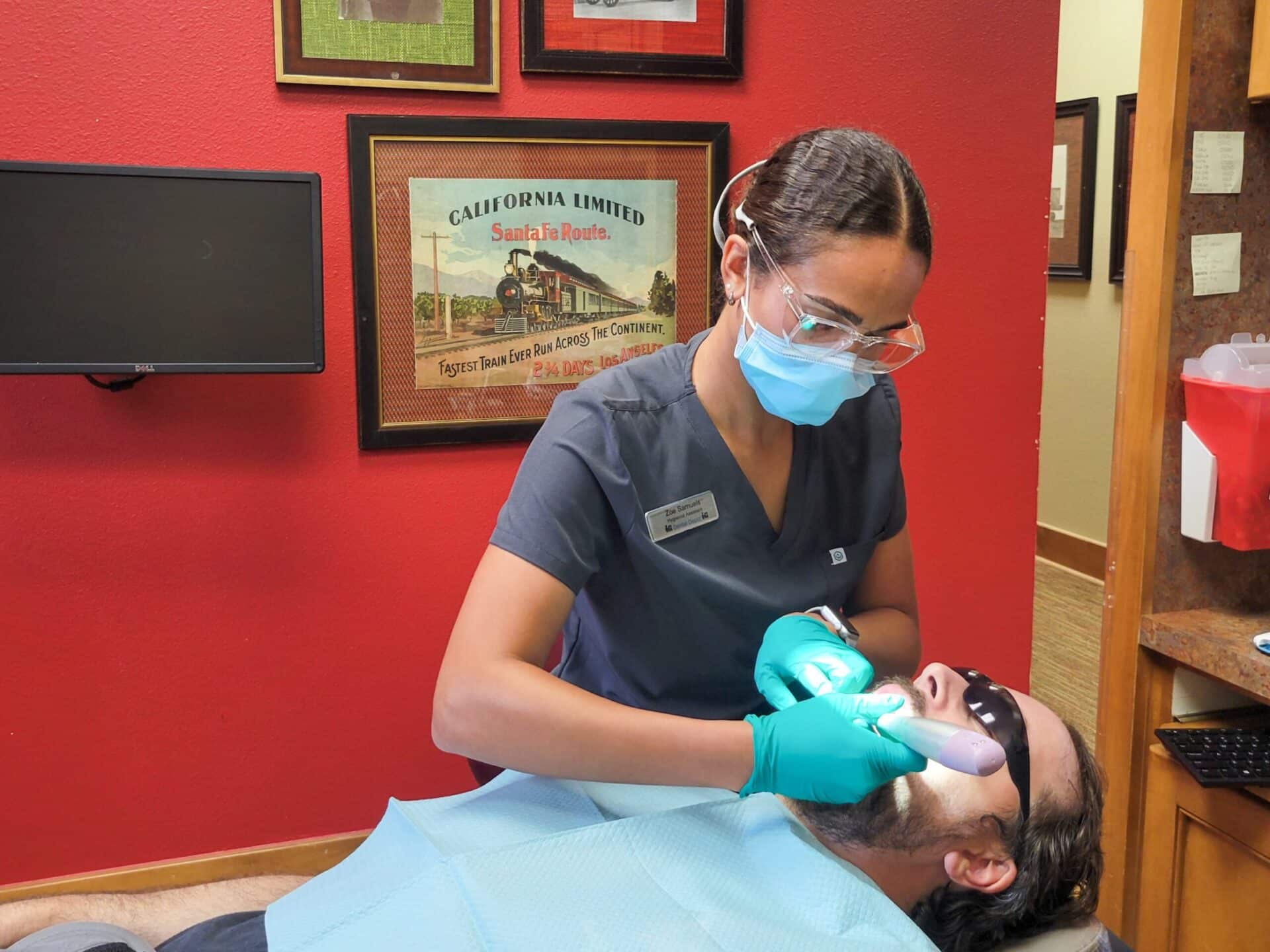A dental deep cleaning, also called periodontal scaling and root planing, is a treatment designed to stop gum disease in its tracks. Unlike routine cleanings, which keep your smile fresh and prevent problems, a deep cleaning treats gum disease by removing hardened plaque, tartar, and bacteria from below the gumline—where your toothbrush and floss can’t reach.
Catching and treating gum disease early is the best way to protect your teeth and gums. Left untreated, it can lead to gum recession, loose teeth, infections, and even bone loss.

The sooner gum disease is treated, the better chance you have of keeping your teeth healthy for life.
Your dentist carefully removes built-up plaque, tartar, and bacteria from above and below the gumline using specialized instruments.
Next, the roots of your teeth are smoothed to help your gums heal and reattach to the teeth, while also making it harder for bacteria to return.
Deep cleanings are often completed one quadrant at a time (upper left, upper right, lower left, lower right). Each quadrant usually takes about an hour, though some patients may have multiple quadrants treated in a single visit.
Many patients notice healthier gums and fresher breath soon after treatment.
With good habits and regular maintenance, you can enjoy the benefits of deep cleaning for years to come.
At Dental Depot, we take pride in offering friendly, high-quality dental care for the whole family. Our experienced team of dentists and specialists provide complete gum care, from preventive cleanings to advanced periodontal treatments, all under one roof.
With convenient locations across Oklahoma City and Tulsa metros, flexible scheduling, and a caring approach, we make it easy to get the treatment you need in a comfortable environment.
Dentists divide your mouth into four quadrants—upper left, upper right, lower left, and lower right. An initial deep cleaning treatment is typically priced per quadrant. Depending on the severity of your periodontitis, your dentist may also recommend that you receive a periodontal maintenance cleaning every four months, which will have an additional cost.
Most dental insurances will cover the cost of deep cleaning as long as your dentist can provide proof of a periodontal disease diagnosis. Dental Depot also offers payment plans and financing options like CareCredit to help you afford the essential dental care you need.
Periodontal disease is often accompanied by gum sensitivity, which can cause pain and discomfort when the gums or teeth are touched. However, the topical numbing gels and local anesthetics applied before the cleaning ensure you feel no pain during the procedure. The only other pain you may feel is mild discomfort, tooth sensitivity, or gum tenderness after the cleaning, which usually subsides within a few days.
Dental deep cleaning provides a non-surgical alternative to gum surgery for the treatment of periodontitis, especially in the early stages. It reduces gum pocket depths without damaging the teeth or gums themselves and requires no removal of the gum tissue. The procedure is performed under local anesthesia, with most patients seeing results after a single treatment and experiencing only minimal—if any—pain or discomfort post-treatment.
Immediately after the procedure, you will be prescribed an antimicrobial mouthwash with chlorhexidine gluconate to help control the bacteria in your mouth and prevent infection. This is also a good time to establish good oral hygiene habits, including twice-daily brushing with an electric toothbrush, daily flossing, and using a mouth rinse after brushing and flossing. You may also need follow-up cleaning visits every three to four months.
Deep cleaning is usually performed in a dentist’s office and consists of two phases: scaling and root planning. A topical anesthesia gel will be applied to your gums around the procedure site before they are injected with a local anesthetic agent. This ensures you feel no pain or discomfort during the cleaning. Then, the provider uses a small scraping tool called a scaler to remove tartar before planing or smoothing the root and reattaching the teeth to the gums.
A standard deep cleaning takes about an hour per quad, meaning patients may have to return for up to four visits to complete their treatment. If the schedule and insurance allows, your dentist may try to complete two quadrants in one visit to save you trips and extra numbing.